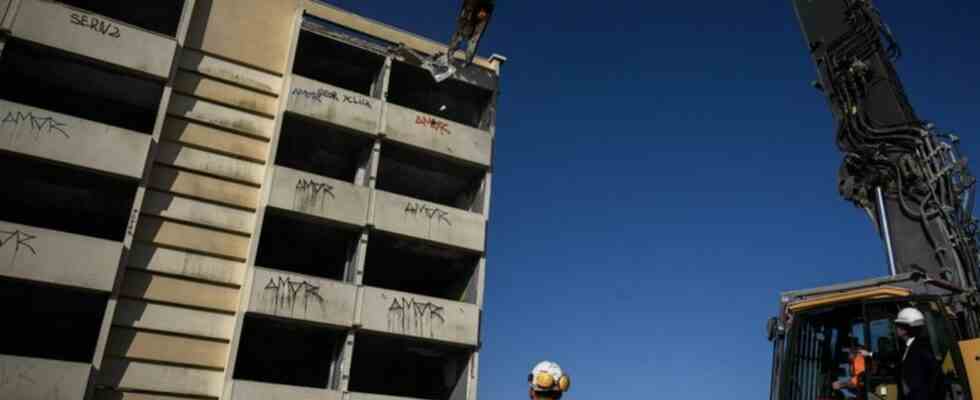climate crisis
Out of the holiday dream: block of flats in France gives way to the sea
An apartment block right on the water has to be demolished – the climate crisis is behind it. photo
© Philippe Lopez/AFP/dpa
They were the ideal holiday apartments with a sea view – now the concrete colossus in France is being demolished because the sea is getting closer and closer. Climate change is accelerating coastal erosion.
The direct view of the Atlantic and the short distance to the water have brought holiday joy to the residents of the “Le Signal” apartment complex in French Soulac-sur-Mer for decades.
Starting Monday, excavators will level the building, which was built in 1967. It is also climate change that is ending the dream of summer and sun for the 78 apartment owners. The sea has washed more and more of the beach and is getting closer to the “signal” that threatens to collapse. The rise in sea level has accelerated the erosion of the Atlantic coast, but also on other stretches of beach in France. A government coastal protection plan already obliged 126 municipalities to take measures last year.
Almost all coastal regions affected
Almost all coastal regions are affected, with Brittany being the most affected. The sea gnaws at 20 percent of the French coast and the beach is narrowing. In the past 50 years, France has lost 30 square kilometers of land. In communities where further coastal erosion is expected in 30 years, new waterfront construction has been banned, with some exceptions. Attempts to secure the beaches by piling up sand, as was also the case in Soulac, ultimately did not help in the long term.
“It’s a very symbolic construction site, when this building was built it was 200 meters from the sea, now it’s 20 meters away,” said France’s Ecology Minister Christophe Béchu on Friday at the “Le Signal” residential complex in Soulac. The fate of the building testifies to the erosion of the coast, which is increasing due to climate change. “And the experts tell us that, depending on global warming, we will have a rise in sea level of 30, 60 up to 120 centimeters in our country,” said the minister with a view to the year 2100. “That is up to 1000 municipalities in France, that’s up to 50,000 homes that will be affected by this nibbling of the sea.”
Memories of wonderful summer vacations
Marie-José Bessac (77) reported to the newspaper “Le Monde” about wonderful summer vacations. In 1983 she and her husband bought an apartment in the “Signal” and year after year they could have seen from the window how the Atlantic was getting closer. In 2010, hurricane Xynthia suddenly brought the sea up to 40 meters from the building. “From that point on, things accelerated in a terrible way. Within five to six years, everything has rushed,” said Mayor Xavier Pintat. In 2014, after another storm, the residents were forced to move out. Only after a long legal battle did the state pay them partial compensation.
“So there is a need to have a strong national plan to accompany the affected communities and homeowners and to prevent you from building buildings like this again,” stressed Minister Béchu. “Now that this phenomenon is known, it is becoming clear to what extent climate change is exacerbating and accelerating coastal erosion.”
The demolition in Soulac acts like a warning signal for France, many media showed the huge concrete colossus that had already been gutted. According to a study by the think tank La Fabrique Ecologique, France, along with Great Britain and the Netherlands, is one of the countries most threatened by rising sea levels in Europe. Responding to the progressive erosion with protective structures only helps in the short term, according to the study. It would be better to move buildings and activities away from the coast and focus on renaturation on the beach. This is planned in Soulac, the nature authority will take care of replanting the dune on which the “signal” was previously located.

